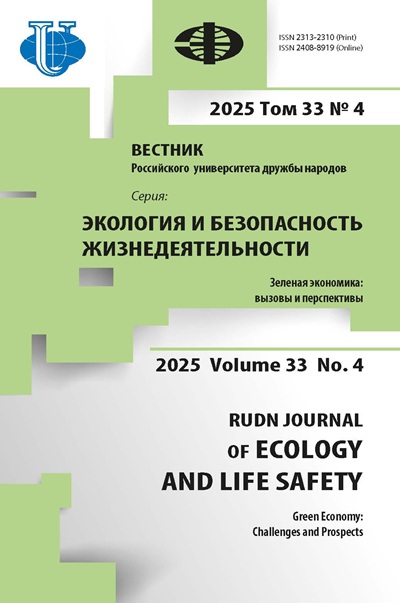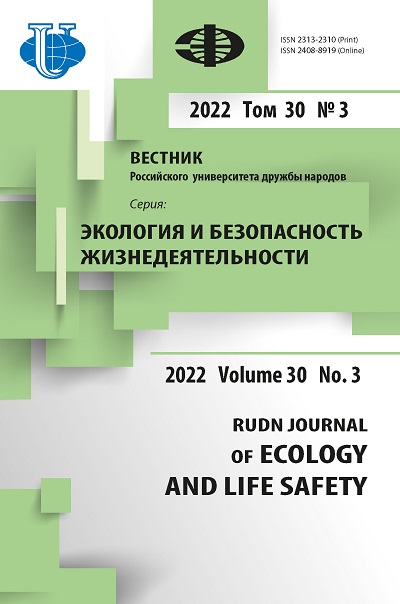Simulation of sorption processes of wastewater treatment by modified zeolites
- Authors: Obuzdina M.V.1, Rush E.A.1
-
Affiliations:
- Irkutsk State Transport University
- Issue: Vol 30, No 3 (2022)
- Pages: 240-249
- Section: Ecology
- URL: https://journals.rudn.ru/ecology/article/view/31886
- DOI: https://doi.org/10.22363/2313-2310-2022-30-3-240-249
- ID: 31886
Cite item
Full Text
Abstract
Based on the results of experimental studies of sorption wastewater treatment, a regression-type mathematical model has been developed that adequately describes the effect of all parameters of the ongoing process on the sorption activity of zeolite: initial concentration, sorption time, process temperature, and medium pH. For the first time in research, a generalized criterion for the consistency of behavior and the width of the domain of definition of the model was used. The processes of involving large-tonnage wastes of chemical production to obtain adsorption materials effective for the extraction of heavy metal ions from industrial wastewater have been studied. Natural zeolites were used as the initial matrix, the main component of which is klinoptilolite. A sulfur polymer obtained from epichlorohydrin production wastes with the main component 1,2,3-trichloropropane is proposed as a modifier. Fixation of the modifier on the surface of the zeolite, as well as the effective adsorption of metal ions, have been proven by IR spectroscopy and energy dispersive analysis.
Keywords
Full Text
Введение На окружающую среду Приангарья, в том числе на водные ресурсы, оказывается существенное воздействие различными антропогенными источниками. Предприятия железнодорожного транспорта, нефтехимической и химической, металлургической и химической отраслей образуют существенное количество сточных вод поликомпонентного состава, одним из основных компонентов которых являются ионы тяжелых металлов, такие как никель, цинк, медь [1]. Цель исследования - решение задачи исключения экологического риска и снижения уровня техногенного воздействия на водную среду, что требует применения системного подхода, включающего математическое моделирование процессов очистки сточных вод. С учетом различного химического состава, а также жесткого регламентирования нормативных значений по содержанию веществ в сбрасываемых очищенных сточных водах продолжается потребность поиска эффективных адсорбционных материалов, обладающих подходящими физико-химическими характеристиками, низкой стоимостью и высокой степенью очистки сточных вод от различных загрязнителей [2]. Важным моментом является моделирование сорбционных процессов для установления зависимости между адсорбционной емкостью и влияющими на нее факторами. Материалы и методы В Восточном Забайкалье располагаются значительные запасы природного минерального сырья, пригодного для получения на его основе новых сорбционных материалов для очистки промышленных сточных вод от ионов тяжелых металлов. В составе природного минерала содержится 60-66 % клиноптилолита, что и определяет его адсорбционные свойства за счет каркасной структуры в виде сочлененных между собой тетраэдров Si(Al)O4. Оставшееся процентное содержание минерала представлено рентгеноаморфной фазой 10-12 %, а также микролином, монтмориллонитом и кварцем с содержанием каждого в количестве 3-5 %. Кристобалит присутствует до 2-10 %. Нами разработан новый способ утилизации отходов производства эпихлоргидрина, основным компонентом которого является 1,2,3-трихлорпропан, с получением адсорбционного материала. 2 Приготовление образца модифицированного цеолита (20 г) с размером частиц 5 мм происходило посредством его модифицирования серой (0,125 моль) при перемешивании в течение 3,5 ч при 60 °С. Серу предварительно растворяли в системе моноэтаноламин-гидразингидрат (0,21 моль и 0,0021 моль). При этом на поверхности цеолита появлялись анионы S2-, с участием которых происходила дальнейшая поликонденсация при добавлении в смесь 1,2,3-трихлорпропана (0,042 моля). Оптимальное соотношение по массе цеолит: S = 5:1. Дальнейшее перемешивание смеси составило 3 часа. После чего осадок подвергали дальнейшему фильтрованию и фракционированию. В состав адсорбента входят такие органические элементы, как C, Н, N, S, Cl c преобладанием серы 31,07 и 22, 19 % для фракции № 1 и № 2 с размером частиц 1-2-мм и 2,5-5 мм соответственно. Установлено, что предпочтительнее использовать более мелкую фракцию № 1. Определено, что при исходной концентрации ионов тяжелых металлов в модельном растворе 5000 мг/л адсорбционная емкость составила 398 мг/г по Ni2+; 268 мг/г по Zn2+; мг/г Cu2+. Результаты исследования и их обсуждение Установлено, что адсорбент клиноптилолитового типа, модифицированный серным полимером, эффективен по извлечении ионов тяжелых металлов из сточных вод. Степень очистки может достигать 99-100 %. При этом при взаимодействии с серой тяжелых металлов получаются гидрофобные сульфиды. Величина адсорбции в 1,5 раза превышает значение предельной адсорбции на немодифицированном цеолите [3]. На адсорбционное равновесие существенное влияние оказывает температурный режим проведения процесса. Построены изотермы адсорбции Ni2+, Zn2+, Cu2+на цеолите, модифицированном серным полимером (рис. 1). Установлено. Что высокий процент степень извлечения Zn2+, Ni2+, Cu2+проявляется при повышенных температурах. а б Рис. 1. Изотермы адсорбционного извлечения Zn2+(а), Ni2+(б) на цеолите, модифицированном серным полимером, зависимости от температурного режима проведения процесса / Figure 1. Adsorption extraction isotherms of Zn2+ (a), Ni2+(b) on zeolite modified with a sulfur polymer, depending on the temperature regime of the process В целях доказательства адсорбционной активности полученного материала и установления механизма адсорбции тяжелых металлов использовали методы ИК-спектроскопии и энергодисперсионного рентгеновского анализа [4; 5]. Фиксация серного полимера на поверхности природного цеолита характеризуется появлением новых полос поглощения 2954,89 см-1и 2903,08 см-1, относящихся к связям С-Н (рис. 2). Полоса поглощения при 1052,41 см-1 природного цеолита, модифицированного серным полимером, смещается в высокочастотную область и появляется при 1074,15 см-1, 1077,16 см-1, 1071,85 см-1 в спектрах цеолита после адсорбции Ni2+, Zn2+, Cu2+соответственно. Полученные данные свидетельствуют о донорно-акцепторном механизме адсорбции. Также наблюдается адсорбция молекул H2O, которая на ИК-спектрах характеризуется появлением колебаний OH-групп при 3624 см-1(Ni2+; Cu2+) и 3622 см-1 (Zn2+) после адсорбции ионов тяжелых металлов. В результате образования сульфидов при адсорбции наблюдается смещение полос поглощения 716,41-723,29 см-1 для Cu2+, 716,41-720,33 см-1 для Ni2+, 716,41-725,42 см-1 для Zn2+. Надпись: Коэффициент пропускания (Transmittance), % Рис. 2. Инфракрасный спектр цеолита, модифицированного серным полимером / Figure 2. IR spectrum of zeolite, modified with a sulfur polymer По данным энергодисперсионных рентгеновских спектров, полученный адсорбент на основе цеолита включает в себя следующие элементы: O, S, С, Si, Al, Cl, K, Ca, Na, Mg. При извлечении меди на поверхности адсорбента цеолитового типа в спектрах обнаруживаются пики Cu2+ в количестве 1,3 % мас. (рис. 3), которые исчезают после проведения десорбции. Результаты экспериментальных исследований послужили основой для разработки математической модели, устанавливающей связь адсорбционной емкости относительно ионов тяжелых металлов, таких как Ni2+, Zn2+, Cu2+ с параметрами проводимого процесса: исходной концентрации, времени сорбции, температуры проведения процесса и pH среды. Впервые в исследованиях использовали обобщенный критерий согласованности поведения и ширины области определения модели. При моделировании процесса адсорбционной очистки сточных вод от ионов тяжелых металлов модифицированными цеолитами использовался метод наименьших модулей, который относится к антиробастным методам [6-8]. Рис. 3. Энергодисперсионный рентгеновский спектр цеолита, модифицированного серным полимером, после сорбции Cu2+ / Figure 3. Energy dispersive X-ray spectrum of zeolite, modified with a sulfur polymer, after sorption of Cu2+ Введем следующие обозначения: y (зависимая переменная) - адсорбционная емкость цеолита, мг/г. Независимые переменные: x1 - начальная концентрация, мг/л; x2 - время адсорбции, час; x3 - температура проведения процесса, К; x4 - значение рН. В каждом из 35 наблюдений присутствует комбинация из переменных (y, x1, x2, x3, x4). Всего 595 пар наблюдений, которые оценивались по обобщенному критерию согласованности поведения (Ф). Регрессионная модель разрабатывалась в классе аддитивных функций, общий вид которой характеризуется следующей формулой: (1) где - j-е преобразование i-й независимой переменной, выбранное из набора (2) Был проведен конкурс моделей для уравнения (1) из = 6563 его альтернативных вариантов. При построении каждого варианта использовалась вся выборка. Таким образом, для каждой переменной используют 9 возможных преобразований, что является стандартным набором преобразований, используемым при реализации конкурса моделей. Степень 4 обозначает число переменных (x1, x2, x3, x4). Слагаемое 2 характеризует методы наименьших квадратов и модулей. Проведенный конкурс моделей с применением метода уступок основан на использовании следующих критериев: Фишера (F); Стьюдента (T = (t0, t1, t2, t3, t4)); Дарбина - Уотсона (DW); множественной детерминации (R); средней относительной ошибки аппроксимации (E) (обычно применяемый в инженерных расчетах показатель): (3) где - расчетные значения у, Впервые использовались для моделирования очистки сточных вод обобщенный критерий согласованности поведения Ф (число совпадений знаков приращений фактических и расчетных значений зависимой переменной, в % к общему количеству пар наблюдений выборки); ширина области определения модели L (чем она больше, тем большими прогностическими возможностями обладает модель). Параметры модели рассчитывались с помощью методов наименьших квадратов и модулей [7], антиробастного оценивания [6]. В результате получена наиболее точная модель вида (4) R = 0,94, F = 114,43, DW = 1,81, E = 6,44 %, Ф = 89 %, Т = (1,17, 16,02, 4,89, 6, -7,73). Значения критериев адекватности модели (4) указывают на высокую точность модельного описания исследуемого процесса. Для построения данной модели было задействовано 6563 альтернативных варианта. Приемлемым диапазоном значений для обобщенного критерия согласованности поведения Ф является 75-100 %. Таким образом, полученный результат Ф = 89 % удовлетворяет нормативным требованиям и показывает высокую точность полученного модельного описания адсорбционного процесса. Это означает, что из рассматриваемых 595 пар наблюдений совпадает по знакам приращения 89 %. По степени влияния на выходной фактор независимые переменные в соответствии со значениями критерия Стьюдента можно расположить следующим образом: (5) Множество D устанавливает допустимые пропорции между компонентами вектора (x1, x2, x3, x4). В основу формирования области D положена специально разработанная регрессионная модель, которую можно условно представить в виде (6) где (7) где δ - ошибка аппроксимации. При этом оказалось, что минимальная на выборке данных ошибка равна = -0,006, а максимальная = 0,026. Таким образом, область определения модели (2) имеет вид (8) Таким образом, полученное значение L = 107 % доказывает большие прогностические возможности разработанной модели. Выводы Разработана адекватная математическая модель регрессионного типа, устанавливающая связь адсорбционной емкости цеолита с факторами, на нее влияющими: исходной концентрации, времени сорбции, температуры проведения процесса и pH среды. Для оценки параметров регрессионной модели были выбраны методы наименьших квадратов и модулей, антиробастного оценивания. В основу математической модели заложены результаты экспериментальных исследований процессов адсорбции тяжелых металлов модифицированными цеолитами. Доказана возможность вовлечения отходов химической отрасли промышленности в технологию создания сорбционных материалов для извлечения Ni2+, Zn2+, Cu2+ из водных сред, что позволяет решить одновременно две экологические задачи: утилизации отходов и снижения техногенной нагрузки на водные объекты. При использовании в качестве модификатора серного полимера происходит гидрофобизация поверхности адсорбента, что улучшает итоговую степень очистки сточных вод в 1,5 раза по сравнению природным цеолитом. На полученных ИК-спектрах после модификации цеолита появляются новые полосы поглощения, характеризующие закрепление серного полимера на поверхности. При адсорбции металлов происходит смещение полос поглощения в более высокочастотные области. Адсорбция осуществляется по комплексному координационному механизму.About the authors
Marina V. Obuzdina
Irkutsk State Transport University
Author for correspondence.
Email: obuzdina_mv@mail.ru
ORCID iD: 0000-0002-4956-0063
Candidate of Technical Sciences, Assistant Professor of Department for Technosphere Safety
15 Chernyshevsky St, Irkutsk, 664074, Russian FederationElena A. Rush
Irkutsk State Transport University
Email: lrush@mail.ru
Doctor of Engineering Sciences, Professor, Heard of Department for Technosphere Safety 15 Chernyshevsky St, Irkutsk, 664074, Russian Federation
References
- Inamuddin D, Mohammad L. Ion Exchange Technology. Theory and Materials. Springer Science & Business Media Springer. Dordrecht. Heidelberg. New York. London; 2012.
- Dabrowski A, Hubicki Z, Podkoscielny P, Robens E. Selective removal of the heavy metal ions from waters and wastewaters byion-exchange method. Chemosphere. 2004;56(2);91–106.
- Obuzdina М, Rush E. Intensification the features of interaction between components of pollutants of industrial waste waters with modified zeolites based on the results of integrated physical and chemical researches. Ecology and industry of Russia. 2021;25(3);36–40. (In Russ.)
- Ross J. Microelectronics Failure Analysis Desc Reference. Sixth Edition. USA: ASMInternational; 2011.
- Shindo D, Oikawa T. Analytical transmission electron microscopy. Moscow: Technosphere; 2006. (In Russ.)
- Noskov SI. The method of anti-robust estimation of linear regression parameters: the number of maximum approximation errors in modulus. South Siberian Scientific Bulletin. 2020;1;51–54. (In Russ.)
- Aivazyan SA, Enyukov IS, Meshalkin LD. Applied Statistics. Classification and dimension reduction. Moscow: Finance and statistics; 1989. (In Russ.)
- Statkus M, Tsysin GI. Mathematical modeling of sorption preconcentration in flow analysis system. Moscow University Chemistry Bulletin. 2009;64(4);192–197.
Supplementary files















